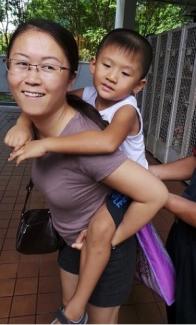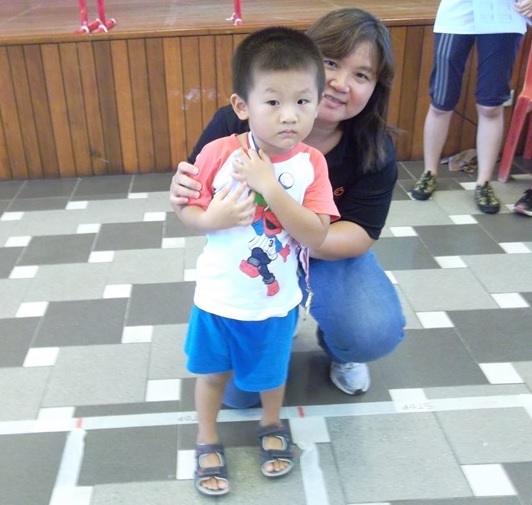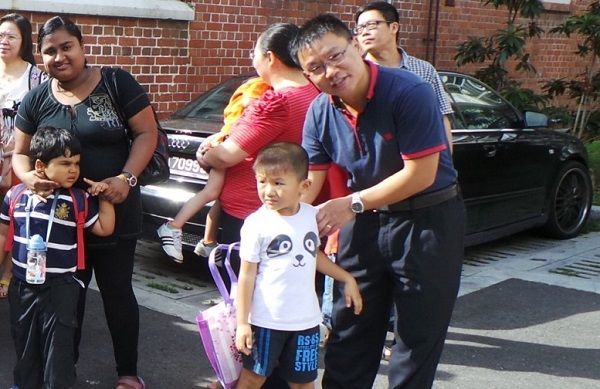
All parties play a part in enabling a child with special needs - the system, parents, the public, as well as the child himself. When one is willing to give the child an opportunity and to accept the child, he is making a difference in the child’s life.
With a “Zao An!”, Fang Zhi would bid a friendly good morning in Mandarin to a few neighbours whom he meets on his way to school like any typical lively boy. Those who first meet him may not be aware that Fang Zhi has Autism Spectrum Disorder (ASD), a developmental disability that affects a person’s behaviour, communication and social interaction.
The News
It is every parent’s hope to see his child grow up first learning to crawl, then walk, speak, and attend school. Mr Wang envisioned this for his son, Fang Zhi, too. However, as the days passed, Mr Wang and his wife realised that Fang Zhi seemed a little different from other children. He seldom spoke or made eye contact with people, and often repeated actions such as turning switches on and off and opening and closing doors.
At 3 years old, Fang Zhi was diagnosed with ASD. Shocked, Mr and Mrs Wang’s hopes of seeing Fang Zhi growing up like any other child crumbled.
Both Mr Wang and Mrs Wang were doing well in their careers. After the diagnosis, Mr Wang knew that either one of them would need a change in work schedule in order to take care of Fang Zhi.
Mr Wang had a discussion with his wife on who was to ‘sacrifice’ for their son. They evaluated the options, such as employing a domestic worker, and getting their parents to take care of Fang Zhi, among others. Eventually, Mr Wang decided to quit his job at a bank. He then set up a financial consultancy company to leverage on his skills and to allow flexibility in his work schedule.
SG Enable (then Centre for Enabled Living) referred Fang Zhi to SPD’s Early Intervention Programme for Infants and Children (EIPIC) in January 2013. EIPIC teacher Ms Hasliah recalled that Fang Zhi preferred to keep to himself in class initially, but after interacting with his teachers and peers for some time, he gradually opened up.

Difficult Times and Optimism
Besides being Fang Zhi’s main caregiver, Mr Wang recounted the many times he and his wife quarreled over Fang Zhi's care, which strained their marriage and relationship with other family members.
However, Mr Wang strongly believed that both parents had to be supportive of the child. Both needed to work out a way to deal with challenges so as not to fall into dire emotional situations. He knew that marriage break-ups or the lack of support from either parent would aggravate the child’s situation and in some instances, could lead to tragedy.
Hence, Mr Wang constantly reminds himself to stay positive, to not indulge in self-pity and denial, and to accept Fang Zhi for who he is.
Mr Wang said that he needs to believe in his son, that he is capable of achieving something. If his parents do not believe in him, who else would? He further added that how parents view a child’s ability has tangible effects on the child’s development. He strives to treat Fang Zhi not like a child with special needs, but like any typical child, instilling confidence in Fang Zhi and making him feel loved.
In addition, Mr Wang feels that parents need to set good examples for their children because children learn and mimic their parents’ behaviour. If the parent loses his temper whenever a difficult situation arises, the child will learn to deal with issues in the same way.

Support of the System
After attending SPD’s EIPIC programme for a year, it was time for Fang Zhi to start lessons in a mainstream kindergarten. Mr Wang received many rejections before eventually finding a kindergarten willing to accept Fang Zhi. Mr Wang moved the family from Tiong Bahru to Toa Payoh to be nearer to Fang Zhi’s kindergarten. When Fang Zhi successfully enrolled in a mainstream primary school in Tiong Bahru, Mr Wang shifted back to the area.
According to Mr Wang, Fang Zhi would not have made progress without the support of the organisations in the system, including KK Women’s and Children’s Hospital where Fang Zhi was first diagnosed, the Centre for Enabled Living (now SG Enable), SPD, My First Skool at Kim Keat Link, and Zhangde Primary School.
He is grateful to the professionals, teachers and principals who were willing to give Fang Zhi a chance and who were professional and patient in helping him, adding that it is important for parents to seek available resources to help their children to develop their potential as far as possible. He is quick to point out that besides support for the child, support for parents is also crucial. They need encouragement and support to help them adjust, adapt and accept the fact that their child has special needs.
The Public’s View
Public perception and discrimination against people with special needs has changed for the better over time, but there is still more to be done.
As parents are a child’s pillars of strength, Mr Wang encourages parents to brace themselves for stigma and to speak up for their child whenever necessary. If a parent feels shame for his child, how could the child be expected to feel confident and loved? “If your child needs to achieve something before papa or mama loves him, like scoring an ‘A’ or going to a famous school, or being a ‘trophy’ child who could be shown-off, then this is not love. Love cannot be conditional.”
Today
Today, Fang Zhi’s cognitive, motor and communication skills have improved greatly and his repetitive behaviour has also reduced. Though taking care of him can still be trying at times with the occasional ‘melt-downs’, Mr Wang is managing. He intends to apply to SPD’s Continuing Therapy Programme to further improve Fang Zhi’s behavioural issues.
Mr Wang no longer feels that he is sacrificing for Fang Zhi. Instead, he finds that Fang Zhi has given him an opportunity to view the world in a different light and to see things from different perspectives.
He anticipates more challenges to come, but is optimistic. “When the child feels that everyone around him is genuinely trying to help him, he will improve”.






